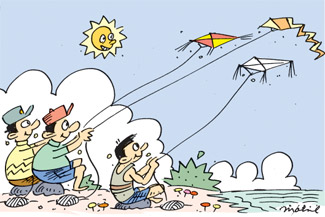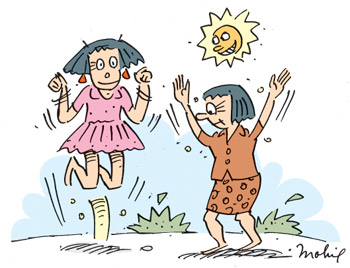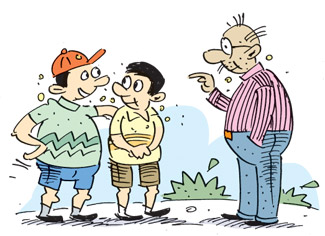|

by R. S. Karunaratne
Use of 'up'
as preposition and adverb
As a preposition, 'up' means 'to or in a higher place.' As an adverb,
'up' means 'towards a higher place.'
1. 'Up' is used to indicate direction and destination.
|

Samís kite is flying up. |
Jack and Jill went up the hill.
Prices are going up.
Lionel went up the ladder to replace a bulb.
The teacher went up to the principal.
Sam's kite is flying up.
2. 'Up' is used to indicate movement to a higher position or increase
in degree.
Go up and ring the alarm bell.
We climbed up the stairs to reach his room.
The tramp walked up to me and asked for Rs. 50.
Some yogis live up in the Himalayas.
3. 'Up' is used to indicate movement towards a person or place.
Go up and meet the librarian.
The dog ran up to the river bank and stopped.
The beggar went up to the rich man and begged for money.
4. 'Up' is used to talk about doing something to completion.
Drink it up, we've to catch the last train.
Let me wash up the cups and plates.
5. 'Up' is used to talk about something becoming lots of pieces.
After hitting the iceberg the ship started to break up.
Nirmala dashed the phone and broke it up.
6. 'Up' is used in many idiomatic expressions.
You go ahead and I'll catch up with you.
He is up there with the leading artists.
(He is as famous as the leading artists)
|

The children were jumping up and down. |
We had a difficult time but things are on the up again. (becoming
better)
After the elimination of terrorism business is on the up and up.
(improving)
After the operation Terrence is up and about again. (well enough)
Don't worry, the old machine is up and running. (in good working
order)
After a hectic day in office she was not up for the party. (ready)
Anuradha is an up-and-coming musician. (becoming more and more
successful)
7. Set phrases
What's up?
(You want to find out what is going on)
The children were jumping up and down.
The new printing machine is up and running. (working well)
You've applied for the post. Now it's up to you to decide.
Know your idioms
Idioms are a colourful and fascinating aspect of English. They are
commonly used in all types of languages, informal and formal, spoken and
written. Here's a random selection of idioms used in sentences.
Indicate the meaning you think is correct and check your answers with
the key.
1. The support given to us by him is above and beyond what we could
have expected.
(a) more than
(b) less than
(c) primarily
2. The garbage dump whether by accident or design benefits certain
people in the city.
(a) intentionally
(b) unintentionally
(c) intended this way or not
3. I left my job of my own accord.
(a) under pressure
(b) voluntarily
(c) involuntarily
4. Those who engage in fraudulent activities should be brought to
account.
(a) be asked to explain
(b) be pardoned
(c) be exposed
5. The employer will take into account the experience of candidates
more than their qualifications.
(a) ignore
(b) not consider
(c) think about
6. The acid test of the new product is whether consumer will buy it.
(a) fault
(b) real test
(c) laboratory test
7. Working mothers have to perform the balancing act between work and
family.
(a) face a difficult situation
(b) sensitive job
(c) pleasant task
8. Get your act together and do a good job.
(a) Dance well
(b) Think hard
(c) Organise your activities
9. I opened up a cafe in my locality but now other are trying to get
in on the act.
(a) obstruct me
(b) become involved in similar ventures
(c) ignore me
10. Regular power cuts have put many machines out of action.
(a) not working
(b) redundant
(c) idling
*********
[Key]
1. (a), 2. (c), 3. (b), 4. (a), 5. (c), 6. (b), 7. (a), 8. (c), 9.
(b), 10. (a).
*********
Starters :
Subject-verb agreement
Today let's have a look at the subject-verb agreement in relation to
negative statements.
We form the negative of most verbs by adding 'doesn't' or 'don't'
before the verb. For a singular subject, add 'doesn't' and change the
verb to its base form.
Positive: Nayana likes music.
Negative: Nayana doesn't like music.
|

Lal and I are classmates. |
Positive: Ivan needs a pen.
Negative: Ivan doesn't need a pen.
For plural subject, and the singular pronouns 'I' and 'you', add
'don't'.
Positive: Manual workers work hard.
Negative: Manual workers don't work hard.
Positive: Rich people need luxury goods.
Negative: Rich people don't need luxury goods.
We can change the negative of the verb 'to be' by changing it to
'isn't' and 'aren't.' For a singular subject, change the verb to
'isn't'.
Positive: Ganguli is at home today.
Negative: Ganguli isn't at home today.
Positive: This is an interesting novel.
Negative: This isn't an interesting novel.
For a plural subject and the singular pronoun 'you', we change the
verb to 'aren't.'
Positive: My sisters are in the swimming pool.
Negative: My sisters aren't in the swimming pool.
Positive: You are a teacher.
Negative: You aren't a teacher.
For the singular pronoun 'I', we form the negative of the verb 'to
be' in this way.
Positive: I am hungry.
Negative: I am not hungry.
Positive: I am at the bank now.
Negative: I am not at the bank now.
Two or more subjects joined by 'and' always take 'don't' or 'aren't'
to form the negative.
Positive: Lal and I are classmates.
Negative: Lal and I aren't classmates.
Positive: We study at night.
Negative: We don't study at night.
Note: 'Doesn't' is the contracted form of 'does not'. 'Don't' is the
contracted form of 'do not.'
'Aren't' is the contracted form of 'are not' 'Isn't' is the
contracted form of 'is not.'
The base form of any verb is similar to the plural form of the verb
in the present tense.
base form: wash, talk, think, go
plural form: wash, talk, think, go
Find the hidden word
There is a word of three letters hidden in each of the following
words. Read the clue and find the word. Check your answers with the key.
1. Grate: .........
clue: an animal.
2. Soaked: ........
clue: a tree
3. Plant: .........
clue: a small insect.
4. Scarf: .........
clue: we travel in it.
5. Shears: .......
clue: we listen with it.
6. Garment: .........
clue: part of the body
7. Steal: ..........
clue: something to drink
8. Beggar: .........
clue: We get it from a hen.
9. Clipper: ........
clue: a part of your mouth.
10. Nice: ........
clue: something very cold.
********
Key:
rat, 2. oak, 3. ant, 4. car, 5. ear, 6. arm, 7. tea, 8. egg, 9. lip,
10. ice.
******** |

